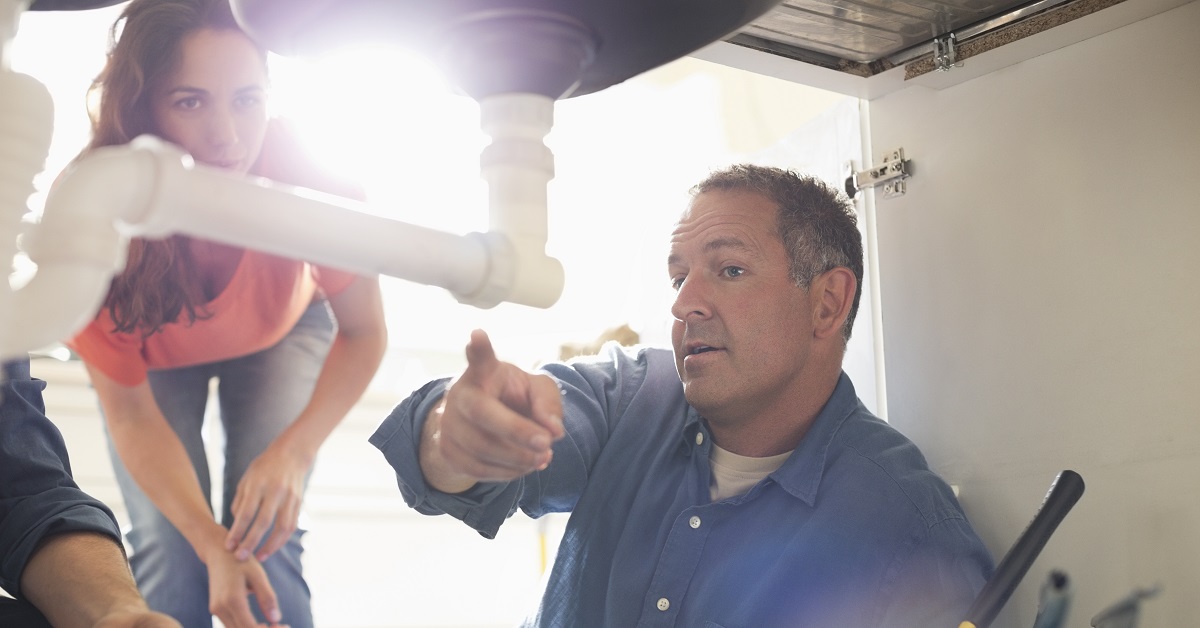Plumbing is often depicted as a complex series of pipes requiring a hands-on education in order to understand the literal ins and outs of your water and waste systems. This preconception can paralyze otherwise responsible homeowners from taking action for fear of not wanting to make it worse. However, most plumbing issues are not do or die.
In fact, most issues do not require a plumber. Service Plus Plumbing is here to answer your questions for the most common plumbing issues and the more serious plumbing emergencies. Need help addressing one of these dilemmas? Service Plus Plumbing has technicians available for all issues and headaches in the Portland area. Contact us today!
Table of Contents
Leaks
Clogs
Reduced Flow
Pipe Corrosion
Malfunctioning Water Heater
What should I ask my plumber?
What do I need to know?
What are the most common plumbing issues?
Leaks
Pipes
Leaky pipes can either be a quick fix or a tricky conundrum depending on where the pipe is located. Most leaky pipes occur under the kitchen sink or in bathroom but can also happen behind drywall or underneath any room with indoor plumbing.
In the latter cases you will probably not know until the drywall shows water damage. When that happens it’s no long a question of just replacing the pipe, but also that section of drywall. Most home improvement stores sell 2×2 drywall replacement panels in order to make the job easier than just replacing an entire section.
Faucets
The leaky faucet is a classic plumbing conundrum stemming anywhere from faulty faucet heads, handles, gaskets, washers, shut off valves, or joints.
In most cases they are a simple replacement project. However, if replacing the particular leaky joint in the overall system does not solve the problem, it might be a problem with the water supply. Any professional plumber can fix any one of these problems with ease.
If you think you have a leak somewhere in the house, take a reading from your water meter, decline to use any water for the next few hours and then check the reading again. If there has been movement, then you have a leak. Addressing this problem will save gallons of water and reduce water bills.
Clogs
Drains
A clogged drain can also be as minor as they come. Most times it’s a matter of fishing out a particular piece of food that was too big in the first place. Common culprits include: egg shells, coffee grounds, celery, potato peels, banana skins, chunks of rice, pasta and grease. In truth, nothing should be going down the drain if it can be thrown in the garbage can or disposal. If whatever is clogging the sink is too far out of reach it might be time to use a disposable drain snake.
Toilets
We all know why a toilet clogs. Or at least we all think we do. But really anything that’s not toilet paper or the business should not go down the toilet drain. Otherwise a flood of divine proportions is inevitable. Sanitary towels, tampons and hair commonly cause the worst clogs in a toilet and are very hard to remove without a drain snake. When a simple plunger or drain snake does not remedy the situation, it’s time to call the plumber.
Do not, under any circumstance, use Drano. The acid will crack the porcelain and turn a simple issue into a full-blown emergency.
Garbage Disposal
Of all the luxuries in a home kitchen, perhaps none is greater than the garbage disposal. With a garbage disposal, most ordinary food items are no longer potential clogging hazards. Most clogs in the garbage disposal occur in the central chamber and will need to be unhooked and unplugged and then unclogged. If it’s not a clog, it might be an issue with the electronics and will probably need replacement.
To avoid serious injury, never work on a garbage disposal before unplugging it from a power source.
Reduced Flow
Sometimes it’s not a matter of a clog but rather a kink in the system resulting in reduced flow of water. The water pressure involved in the water supply. Most issues of reduced flow involve the faucet themselves.
Checking the aerator, cartridge and supply lines should be first on the priority list.
If you just recently remodeled your home and added more water outlets you might need to adjust the pressure reducing valve. It should be located where the water line enters your home. It will also be in your interest to check the water meter for a leak. As mentioned before shut off the water to the house, check the water meter, then check again in a few hours.
Pipe Corrosion
Pipe corrosion can be a compound factor to any leaks, burst pipes and reduced water pressure. Eventually a pipes will need to be replaced. While burst pipes are an obvious thing to spot, you will want to use that same water meter trick to find any non-evident leaks.
If a leak is confirmed behind the wall, you will want to call a plumber, dealing with pipes in tight places is the nature of the job.
Malfunctioning Water Heater
Water heaters host the single biggest reservoir of water in the home. From this single point comes the hot water for sinks, showers, bathtubs, you name it. It’s also a likely leaky culprit. Not just for water, but for gas too.
A gas leak is a surreptitious crisis; failure to realize one can lead to serious injury or even death. Thankfully there is one telltale sign that gas is leaking into the house: the smell of rotten eggs. Because most gas enters into the home to service the water heater, you will want to start the process there.
If you think your hot water heater is leaking, turn off the heater, disable the water supply and disconnect the gas. Make sure to clean up any water leaks. Identify any faulty connections or if the tank itself has a crack. Service Plus Plumbing provide services for repairing or replacing water heaters in the Portland area. A water heater is an integral part of any home and should be serviced immediately.
What other questions should I ask my plumber?
How can I check if I have a leak?
Just to reiterate: turn off your water, take a reading of the water meter, wait for a few hours–three to four should do it–then take another reading. If the meter has moved, then you most likely have a leak.
Why is my water discolored?

Have questions about how to check a leak? Service Plus Plumbing have the answers!
Discolored water is indicative of dirt, rust or other particulates entering the water supply. Generally, milky white discoloration is a mineral buildup from the water heater. Yellow or brown water is rust from an iron pipe. Blue-green coloration is from a corroding copper pipe. In both cases a pipe will need to be replaced. Black and gray water means rubber gaskets or carbon pieces from household filters are breaking down in the water. Replacing these parts and filters will be vital. For more, the City of Portland has a report on why water might be discolored.
What do I need to know about my plumbing?
There’s quite a few things you should know as Plumbing 101’s to prevent issues and avoid calling a plumbers for simpler tasks:
Know what you can and cannot put down the sink or toilet.Egg shells, banana and orange peels, celery, chunks of rice, pasta, grease and hair are the main culprits in sinks. Only toilet paper and human waste should go down the toilet. Everything else? Trash it. If you need to unblock a drain and don’t want to use Drano, then a baking soda and vinegar solution might do the trick.
Know where your shutoff valve exists. The simplest way to stop any problem involving water is to restrict water flow.
Know where your water meter exists. We’ve probably mentioned this particular meter plenty of times that it goes without saying why. But nonetheless, if you want to detect a leak, know where your water meter is so you can take readings before and after turning the water off.
Know where your condensate pipe exists. The condensate pipe expels moisture from a boiler. If you have a boiler, you should know where this pipe lies and how to thaw it out. If you have a frozen pipe, attach heatpads, warm washrags or hot water bottles to alleviate the pressure and avoid calling a plumber for a trivial issue.
Know what type of pipe you are looking at. As a general rule PVC pipes are white, ABS pipes are black and both deal with drainage and waste. PEX pipes are red and blue and deal with hot and cold water supply respectively. The bronze hue of copper pipe also work as water supply, and provide a common link for hot water heaters. Galvanized pipes are a silver color and can work for water supply, drainage and waste systems. Metal pipes are generally more rare than their plastic counterparts. Click here for more information!
Know when to call a plumber and when to DIY. Sometimes we face a problem out of our wheelhouse and don’t recognize it. What could be a simple leak could turn out to be an indicator of corroded pipes or a backup. It’s important to examine the cost in time as well as money as well. In the face of a major plumbing emergency like a major pipe burst, gas leak, sewer backup or when you have no water flow, it’s important to know the basics and then call the plumber for the advanced problems.
Need plumbing in Portland?
We hope you found answers in our as-comprehensive-as-possible post for frequently asked questions.
If you are looking for a plumbing professional for your next plumbing job in the Portland area then Service Plus Plumbing is here to help. Our skilled plumbers can help with routine maintenance of kitchen plumbing, bathroom plumbing and anything from a common issue to a major inconvenience. Contact us today and a licensed plumber will be there to help as soon as possible.

